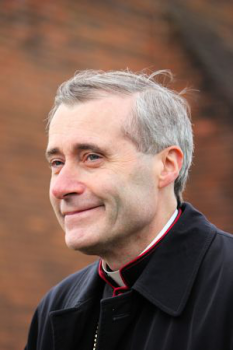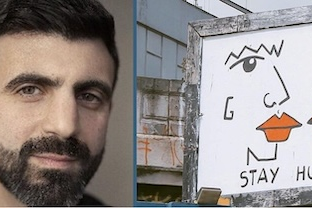Bishop of Shrewsbury welcomes defeat of assisted suicide Bill

Bishop Davies - image S Caldwell
The Bishop of Shrewsbury has welcomed the overwhelming defeat of a Bill to legalise assisted suicide. The Assisted Dying Bill was rejected by 330 votes to 118 after a Second Reading debate in the House of Commons.
The Rt Rev Mark Davies said that "it was greatly to the credit of the parliamentary system" that the Bill was thrown out after scrutiny by MPs.
The Bishop said: "Members of Parliament recognised that legalising assisted suicide would have dangerously removed legal protections from some of the most vulnerable members of society and ushered in a 'culture of suicide' among many who feel a burden to family and society.
"In the face of the remorseless advance in our life-times of what St John Paul II called a 'culture of death' this is a moment when the sanctity of human life has been upheld by legislators.
"I believe this represents an opportunity to unite with many others in advancing the 'cause of life' especially in developing the best care our society can give to the elderly and the terminally ill."
Bishop Davies added: "The euthanasia lobby used the slogan 'dignity in dying' when they meant suicide and eventually medical killing.
"Genuine dignity at the end of our lives must be found by society genuinely cherishing the value of every person in old age and in sickness.
"This now represents a challenge in an ageing society to both resource and develop the highest standards of palliative care."
The Private Member's Bill was introduced by Rob Marris, Labour MP for Wolverhampton South West, and represented the first vote on assisted suicide since 1997.
The Bill sought to permit adult patients deemed within six months of death the right to obtain poisons with which to kill themselves, pending approval by two doctors and a judge sitting in a so-called "suicide court".
But MPs were not persuaded the by the arguments and they rejected the Bill by a ratio of three to one, with the 74 per cent of opposing votes even higher than the 72 per cent who rejected the last assisted dying Bill 18 years ago.
A majority of both Labour MPs (91 compared to 72) as well as a majority of Conservative MPs (210 compared to 27) were opposed to the Bill.
In the Diocese of Shrewsbury, opponents included the Conservative MPs Graham Brady (Altrincham and Sale West), Fiona Bruce (Congleton), Owen Paterson (Shropshire North), Mary Robinson (Cheadle) and William Wragg (Hazel Grove).
From the Labour benches opponents included Frank Field (Birkenhead), Margaret Greenwood (Wirral West), Mike Kane (Wythenshawe and Sale East), Justin Madders (Ellesmere Port and Neston), Chris Matheson (City of Chester) and Derek Twigg (Halton).
MPs with constituencies within the Diocese who voted in favour of the Bill included Lucy Allan, the Conservative MP for Telford, and Labour MPs Ann Coffey (Stockport) and Angela Eagle (Wallasey).
"Parliament has made its voice clearly heard," said Miss Bruce, speaking after the debate. "The most vulnerable, as well as the Courts, now have absolute clarity that assisted suicide is not the route this country will go down.
"That is a victory for the vulnerable, not least the many disabled people who have campaigned so passionately against this dangerous Bill," she continued.
"This Bill proposed that suicide was sometimes an answer, and that we should sometimes respond to a person's suicidal feelings with a lethal injection. That is against everything that our healthcare system is built on regarding the value of life and protecting the vulnerable, and would have been a backward step in an age where we are finally beginning to properly tackle issues of mental health.
"The Commons vote represented a truly compassionate affirmation by MPs of the safeguards that exist in law to successfully protect patients in a vulnerable position from undue pressure to end their lives.
"It defends the essential truth that there are better answers to the suffering of the terminally-ill than helping them to kill themselves. Doctors from places, like Oregon and the Netherlands, where euthanasia is legal, warned the UK not to make the same mistake - and Parliament has heeded their warnings.'
She said: "Our focus must be on improving the standard and the availability of palliative care to all patients who need it. The Access to Palliative Care Bill proposed by Lady Finlay of Llandaff, a leading palliative care expert and immediate past President of the British Medical Association, is the best opportunity for progressive reform in this area, and truly worthy of Parliamentary support."
Her view was echoed by Archbishop Peter Smith of Southwark, chairman of the Department for Christian Responsibility and Citizenship of the Bishops' Conference of England and Wales, in welcoming the outcome of the vote.
"There is much excellent practice in palliative care which we need to celebrate and promote, and I hope now the debate on assisted suicide is behind us, that this will become a focus for political action," said Archbishop Smith.
But Dignity in Dying, the group formerly known as the Voluntary Euthanasia Society, hit out at MPs for rejecting the Bill.
Sarah Wootton, DiD chief executive, said: "This result goes to show just how ridiculously out of touch MPs are with the British public on the issue.
"With the overwhelming majority of the public supporting the Bill, it's an outrage that MPs have decided to retain the current law which the former Director of Public Prosecutions, the House of Lords, and the public all believe is leading to suffering and injustice for dying people."
But even claims that the legalisation of assisted suicide enjoy widespread public support were looking increasingly shaky after respected academics questioned the methodology of polls conducted for Dignity in Dying.
A study by the Institute for Social and Economic Research at Essex University concluded that a survey which found up to 82 per cent of the public supported a change in the law must be treated with "caution".
It questioned the way the online poll was carried out and suggested it missed whole sections of the population and suggested that the poll failed to take into account the views of many elderly people, the terminally ill or medical professionals - who were on the whole less enthusiastic about assisted suicide than the rest of the public.
The survey was also flawed because it did not give respondents the option to say they did not have an opinion in answer to the questions, pushing them instead to give answers in favour of assisted suicide.
No to Assisted Suicide, the group that commissioned the report by the Institute for Social and Economic Research, announced that it was intending to lodge a complaint with the Market Research Society, the industry umbrella organisation, about the way the poll findings have been used.


















